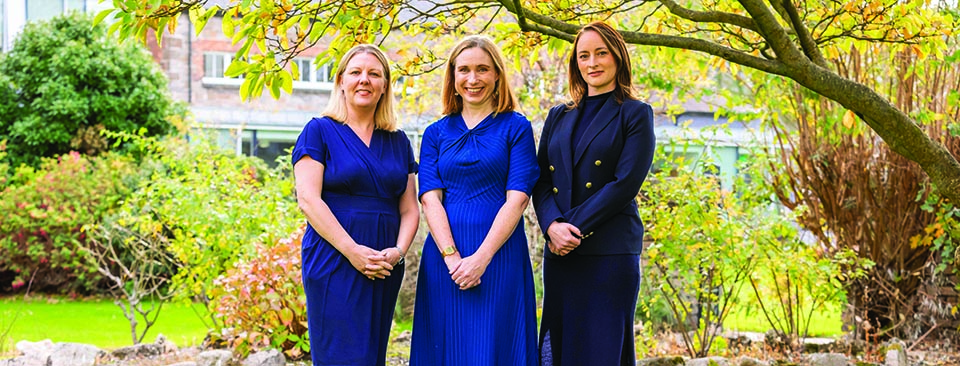
Our house
The in-house sector is expected to make up close to 30% of the profession within a few years. Mary Hallissey speaks to Alison Bradshaw, chair of the Law Society’s busy In-House and Public Sector Committee
Of any given Blackhall Place PPC class, close to a third could end up working as in-house counsel. This demonstrates the wider importance of the Law Society’s In-House and Public Sector Committee to the profession.
It’s a busy committee, with 25 members and about eight meetings a year, combining virtual and at least three in-person formats.
A key goal is to build a culture of even greater involvement with the Law Society, given that the sector is expected to make up 30% of the profession within a few years. The committee will be making it a primary aim to encourage more representation of the sector at Law Society Council level.
“We do need to have a pipeline there. It’s something I see us looking into as we head into next year, because we have realised deciding to run for Council is not just something you decide close to the deadline date; it’s something that a candidate needs to plan,” says committee chair Alison Bradshaw.
Public and private
Alison notes that the public sector has always been strongly represented in in-house numbers, while the private side has surged in recent years, in tandem with increased inward investment to Ireland and the economic growth it fosters.
“We have so many companies here now, and companies that seek out Ireland as their base,” she says. “Those companies generally find that it is beneficial to them to have in-house legal. Once they make Ireland their base, it makes sense to have Irish solicitors on staff.”
This has led to a huge growth in numbers – to 25% of the profession, with expectations of growth to 30% over the next five years.
“That’s the profile, and within the solicitor community, it’s becoming quite a recognisable cohort. We want to really set out and get a clear picture of the sector, as to what our composition is and our concerns are,” says Alison.
“We want to improve awareness of the profile and standing of the in-house community within the Law Society.
“Another area we would like to promote is raising the level of the sector’s representation on Law Society committees, which would benefit in terms of spreading in-house expertise.”
Different strokes
“The sector is a bit different,” Alison notes. Lawyers in private practice are surrounded by other lawyers, while in-house solicitors work side by side with a wide range of stakeholders and skillsets.
“In private practice, you need to go and fetch your work, you need to win it. In-house, by the nature of the role, the work finds you.”
There may also be slightly less formality to the legal advice that’s delivered in-house, she adds. “You’re getting asked questions as you go, and you need to be able to think on your feet.”
The other big difference is the necessary in-depth knowledge of the organisation that the in-house lawyer is supporting.
“When you work in-house, you really are expected to know your organisation inside out and know the impact of the advice that you’re providing, while obviously remaining impartial.
“That knowledge can actually make your input impactful very quickly,” says Alison, who works as part of the AIB legal team.
The Guide for In-House Solicitors on the Law Society website is an excellent resource, Alison says. “There’s years of experience ploughed into that.”
Membership of ECLA – the European Company Lawyers Association – is a vital resource, because it provides a pan-European perspective for in-house company lawyers.
In some European countries, it can be the case that lawyers practising in-house don’t have the same rights in relation to legal professional privilege, and the committee is actively monitoring the situation in other jurisdictions through its ECLA membership.
Role of honour
Impartiality is the key part of the role of in-house counsel, Alison notes. Legal counsel also act as a support for decision-makers and help them to proceed through the practical implications of business initiatives.
“It’s about helping them to make that link between where the legal clarity ends and the actual hard decisions. It’s in that zone, I think, that we bring most value.”
In-house lawyers often buy in legal advice from private practice, Alison points out.
“The relationship between in-house lawyers and private practice is that we can both co-exist very well together and learn from and complement one another. The more we’re all involved in one central Law Society, the better for the purpose of the profession, for practices, and for organisations.”
Packed agenda
“For each large agenda item, we have a committee subgroup that advances that. We do a lot of work in between meetings and then report back as to how things are progressing,” Alison says. “We have a lot of activity in our agenda; it’s always very packed.”
The use of subgroups for various initiatives allows for more focused work by the committee. Guidance on pro bono work and other legal issues underscores the committee’s commitment to supporting in-house lawyers in their roles.
The committee holds two large sectoral events each year – a panel discussion in the spring and an annual conference in October. Each event is supported by different subgroups, which monitor legal developments to decide on topical content.
“We are innovating and leading in transformative times, so we are focused on how lawyers get ahead as leaders in their organisation. Right now, we’re looking at rising inhouse numbers, and we do expect that to continue.”
The expertise and skillset of the in-house lawyer lies in the ability to help stakeholders formulate the right question and to know how to get the answer, Alison says.
“It’s a very fulfilling and viable career choice in itself, because of the expertise developed in-house.”
Mary Hallissey is a journalist with the Law Society Gazette.